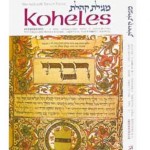Kohelet – sceptic and believer
 The end of Sukkot is associated with the Megillah of Kohelet (Ecclesiastes).
The end of Sukkot is associated with the Megillah of Kohelet (Ecclesiastes).
The title Kohelet derives from a verb which means “to gather an assembly”.
Why Kohelet is the name of a Biblical book is explained in various ways.
Some take it to mean a preacher in a congregation, others a convenor of a congregation for the purpose of hearing instruction, a gatherer of wisdom and even (connecting the work with an Arabic root) a sage old man.
The word is feminine, perhaps as a personification of “wisdom” (chochmah, a feminine word).
There was prolonged debate before this book was accepted into the Biblical canon. It was argued that the book contradicted itself, its contents were not Divine but human wisdom, and it had heretical tendencies.
Finally it was accepted into the Bible, though some argue that the stamp of orthodoxy required a pious epilogue such as Chapter 12 verse 13: “The end of the matter, all having been heard: Fear God and keep His commandments, for this is the whole duty of man”.
As Driver puts it, the theme of the book is that: “Life under all its aspects is dissatisfying and disappointing: the best that can be done with it is to enjoy – not indeed in excess, but in a wise and well-considered moderation, and as a gift intended by God to be enjoyed – such pleasures as it brings with it.”
Yet the book does not offer a systematic or consistent philosophy. LV Snowman said, “The preacher was a pessimist, a sceptic, and a believer all in one”.
Instead of setting out an organised theory of life, Kohelet documented, as it were, his varying reactions to the differing experiences he had undergone.
In Jewish tradition, it was Solomon who wrote Kohelet. Shir HaShirim (Song of Songs) was the product of his springtime youth, Mishlei (Proverbs) of his mature adulthood, and Kohelet of his rather cynical old age.
Victor Reichert calls the theory of Solomonic authorship a thin disguise, possibly designed to save the book from exclusion from the Bible.
AJ Grieve suggests that: “As the book most akin to it, Job, discusses a perplexing moral problem in the person of a hero of antiquity, so here Solomon is taken as the type of a wise man who had thoroughly explored all human experience”.
Robert Gordis argues that Solomonic authorship is not a figment of folk imagination, since the creative activity of Wisdom teachers had its first flowering in Solomon’s reign.



